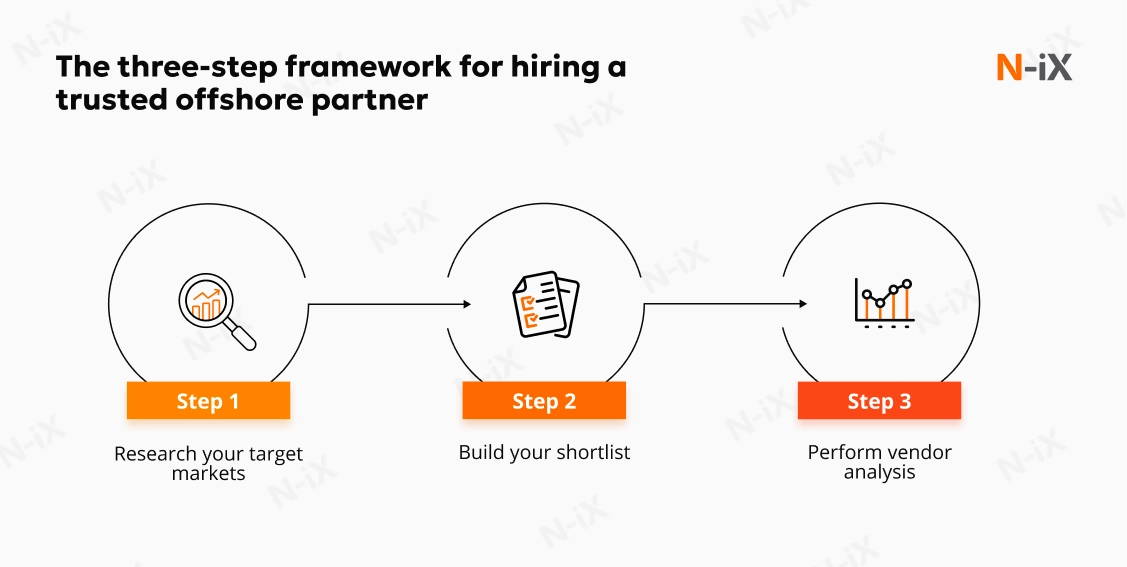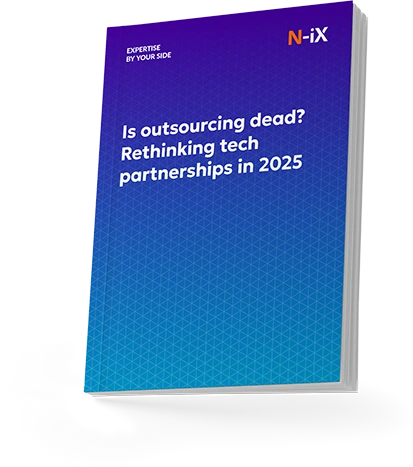Choosing the right offshore development partner accelerates your development, reduces costs, and gives you access to world-class expertise. Choosing the wrong one can derail your entire project: missed deadlines, quality issues, security breaches, and budget overruns become the norm rather than the exception.
The difference? Asking the right outsourcing questions upfront.
Most companies only scratch the surface when evaluating vendors, focusing solely on pricing and availability. Then, months into the project, they discover critical gaps in security protocols, unrealistic team scaling promises, or communication breakdowns that could have been identified during the vetting process.
This guide provides 70 essential outsourcing questions that uncover red flags early and help you make a confident partnership decision. Use these questions to assess potential providers across every dimension that impacts project outcomes: company expertise, security standards, project management capabilities, team integration practices, and delivery processes.
Strategic framework for vendor evaluation
Before diving into the 70 outsourcing questions, it's crucial to understand the strategic context of vendor selection. Here's why:
Without a structured approach, even the best questions fall short. Many companies jump straight into asking vendors detailed questions without first defining their evaluation criteria or understanding the broader market landscape. This leads to comparing apples to oranges: wasting time on unsuitable candidates or missing qualified partners entirely.
The three-step framework below helps you:
- Focus your search on regions and vendors that match your needs
- Ask questions strategically rather than scatter-shooting inquiries
- Interpret answers effectively by understanding industry benchmarks
- Spot red flags early, before investing hours in detailed evaluations
Think of this framework as your vendor evaluation roadmap. It ensures you're asking the right questions to the right companies at the right time. Only after completing preliminary research and building a qualified shortlist should you deploy the following comprehensive question set.
The three-step vendor selection framework

1. Research your target markets Identify target regions based on your technical requirements, time zone preferences, and budget parameters. Research each region's IT industry maturity, talent density, and legal framework. Consider factors like English proficiency, cultural compatibility, and infrastructure stability.
2. Build your shortlist (3-5 candidates) Narrow down to three to five companies that match your criteria. Evaluate them using:
- Company websites: Service offerings, case studies, technical expertise
- Third-party platforms: Clutch, G2, GoodFirms for verified reviews and ratings
- LinkedIn: Team size, growth trajectory, employee tenure patterns
- Industry presence: Awards, certifications, partnerships, thought leadership
Look for domain expertise in your industry, proven experience with companies of your size, and a track record of long-term client relationships.
Are you prepared for what’s next in IT outsourcing? Find out in the ebook!


Success!

3. Deep-dive due diligence This is where most companies fall short and where the 70 questions in this guide become essential. Contact your shortlisted vendors with a comprehensive questionnaire covering:
- Company stability, legal compliance, and security standards
- Recruitment strategies, team composition, and retention rates
- Project management methodology and delivery processes
- Communication protocols and quality assurance practices
The vendors' content and responsiveness reveal their operational maturity and partnership readiness.
Read more: Offshore staff augmentation: Ultimate guide
What to ask a nearshore company
By now, you've used public sources: vendor websites, LinkedIn, review platforms like Clutch and G2, to build your shortlist. These sources provide helpful baseline data: company size, service offerings, client lists, and testimonials.
But for long-term partnerships, baseline information isn't enough. You need deeper insights into strategic stability, technical capabilities, security standards, and operational maturity-details that only direct conversation reveals. The company-related questions below help you systematically assess each candidate across the factors that determine partnership success:
Basic company information:
- How long has your company been in business?
- What is your company's size?
- What is the structure of your company?
- Which services do you provide?
- What is the core focus of your company?
- What industry and domain expertise do you have?
- What are your models of cooperation with clients?
- What is your annual company growth rate?
- What is your projected growth for the next year?
- What sets your company apart from other vendors of your size and specialization?
Market presence:
- What is the state of the IT industry in your region?
- What is your role in developing the tech industry in your region?
- Is your company a member of any organizations?
- Has your company received any industry awards? Has it been included in any industry rankings recently?
- What are your company's long-term goals?
Facilities:
- How many offices do you have and in which countries/cities?
- How do you ensure a comfortable working environment for your employees?
- Could you send us the photos of your main offices?x
- How do you ensure safety in the workplace?
- How do you ensure information security in the workplace?
Company expertise:
- Which technologies do you specialize in?
- How do you develop new expertise in your company?
- How do you ensure knowledge transfer within the company and adoption of new technologies?
Security:
- What are your security standards?
- Do you have the information security department?
- How can I be sure that my data and intellectual property are protected?
- What are your policies for protecting data both physically and procedurally?
- Do you have a comprehensive disaster recovery plan?
- How do you ensure GDPR compliance?
Read more: Outsourcing software developers: An ultimate guide
Legal aspects:
- What reforms and innovations is your country undergoing to ensure safe business operations?
- What is your professional responsibility within the project?
- What legal ethics are established in your company?
- What kind of legal responsibility would you bear in case of project failure?
- What accreditations do you have as a service provider?
References:
- Do you have experience working with companies of our size and industry?
- Could you provide relevant client references?
- Can you commit to a long-term partnership?
- Could you specify which clients you've worked with for over 5 years?
Cooperation models:
- What is your pricing model? What are the project implementation costs?
- Do you have the capacity to meet our demand?
- Do you have service level agreements?
Staff-related questions
Having enough developers isn't enough. You need the right developers who will stay engaged throughout your project. Many companies discover too late that their vendor struggles with high turnover, slow team scaling, or poor retention of senior talent. By then, you're managing constant knowledge loss and onboarding delays instead of building a product.
Equally critical is distributed team collaboration. Even with talented developers, projects stall when remote teams can't align on technical standards, communication protocols, and workflows. These staff-related questions to ask when outsourcing tasks assess both talent stability and distributed team integration capabilities:
Recruitment:
- What is the engineering talent pool in your country?
- What are your strategies for hiring software developers for a project?
- How do you assess the professional competence of software developers?
- How do you track employees' professional growth?
- How easily can you ramp up a development team?
- What is the annual employee turnover rate in your company?
- What is the average staff turnover rate within your industry in your country?
- How do you ensure employee training, learning, and development?
- How many of your employees work full-time/part-time?
- What is the ratio of IT staff to all employees in your company?
Team integration:
- How do you manage distributed teams?
- How do you build trust between an offshore and an on-site team?
- How do you establish smooth cooperation between them?
- How do you ensure effective communication within a project?
- What tools do you use to improve communication?
- How do you deal with mismanagement?
- What is the English proficiency of your software developers?
- How do you manage time-zone differences?
Continue reading: Effective knowledge transfer plan: moving IT outsourcing projects to a new vendor
Process-related questions
You've assessed vendor credibility and talent capabilities. Now evaluate execution, the make-or-break factor in outsourcing success.
Strong processes create predictable outcomes: clear accountability, transparent progress tracking, proactive risk management, and consistent quality standards. Weak processes create chaos, regardless of team talent.
These essential questions to ask when outsourcing software development reveal whether a vendor has the project management maturity and delivery standards your partnership requires:
Process management:
- How do you provide operational transparency?
- Could you walk me through your standard project implementation process?
- Will this project have a dedicated project manager?
- Who will be responsible for the successful project delivery?
- Who will maintain risk analysis and management?
- How can I keep track of the project progress?
- Will you provide me with regular status reviews?
- Will you be able to consult us in terms of innovative solutions?
- Who will oversee the software development lifecycle to ensure the timely delivery of software?
- How do you usually improve processes to ensure high team performance?
- Who will manage the team's visits to our on-site location?
Summing up
Outsourcing success depends on vendor selection. Choose well, and you'll accelerate development while reducing costs. Choose poorly, and you'll manage constant issues instead of building a product.
The key? Asking comprehensive outsourcing questions before signing. These questions help you evaluate real capabilities, identify red flags, and validate whether a vendor can deliver on their promises. Strong vendors welcome detailed inquiry and engage in substantive discovery conversations. Weak vendors avoid depth and provide generic answers.
Remember: vendor evaluation is bilateral. Strong providers ask you detailed questions about project scope, technical requirements, and business objectives. If they don't engage actively from the start, expect communication problems throughout execution.
The 70 outsourcing questions above give you a systematic evaluation framework. Use them to assess company credibility, talent capabilities, and process maturity, then choose your partner confidently.
Have a question?
Speak to an expert





